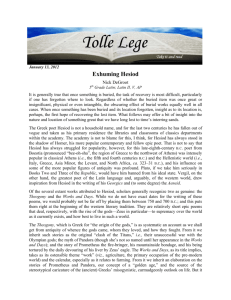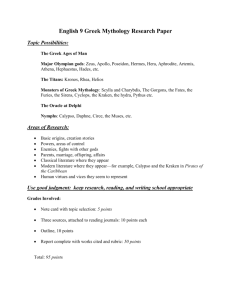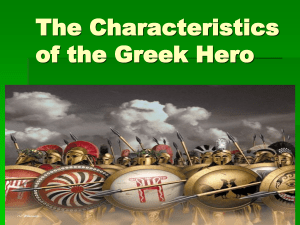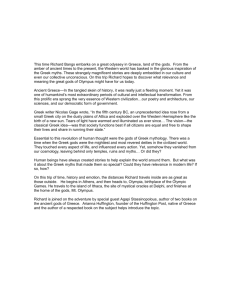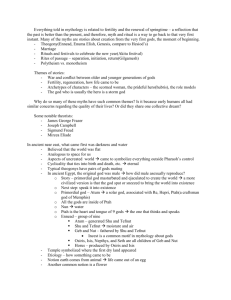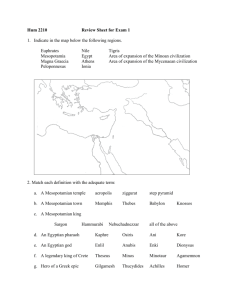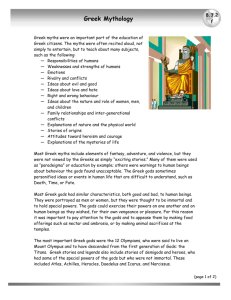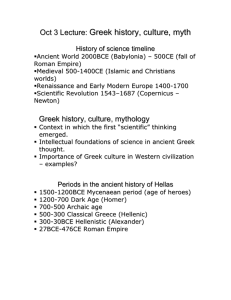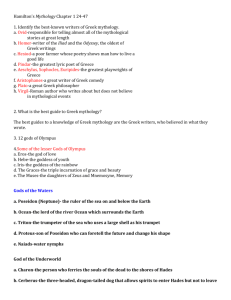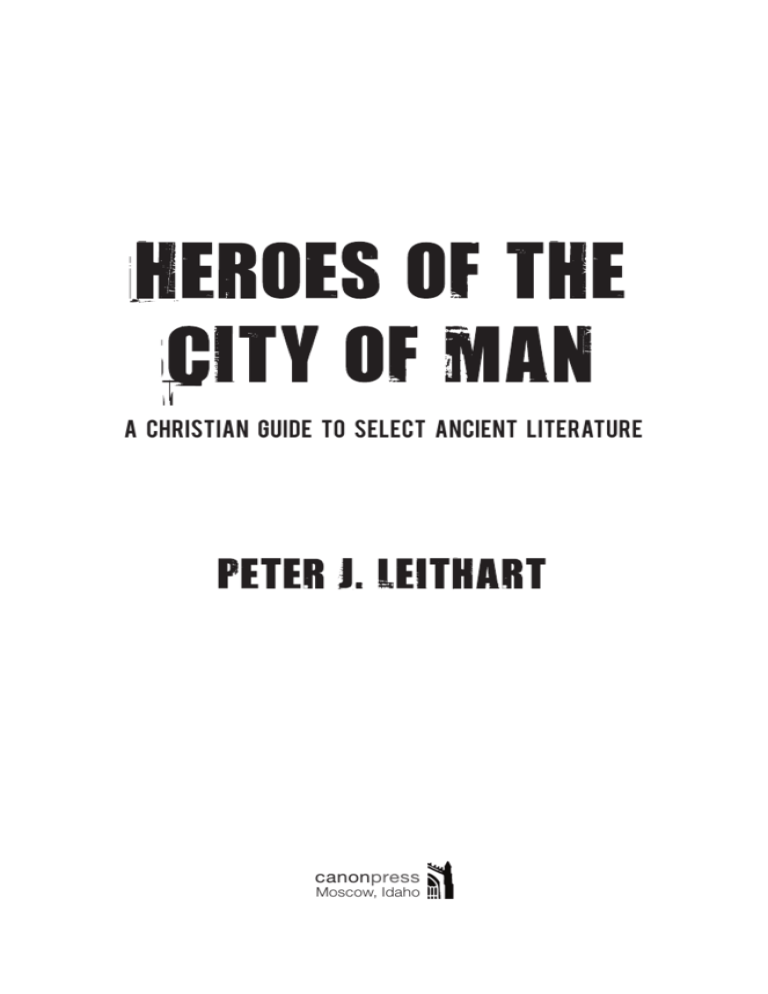
A Christian Guide to Select Ancient Literature
canonpress
Moscow, Idaho
Published by Canon Press
P.O. Box 8729, Moscow, ID 83843
800-488-2034 | www.canonpress.com
Peter J. Leithart, Heroes of the City of Man:
A Christian Guide to Select Ancient Literature
Copyright © 1999 by Peter Leithart
Cover design by Laura Storm.
Printed in the United States of America.
All rights reserved. No part of this publication may be reproduced, stored in a
retrieval system, or transmitted in any form by any means, electronic, mechanical, photocopy, recording, or otherwise, without prior permission of the author,
except as provided by USA copyright law.
Library of Congress Cataloging-in-Publication Data
Leithart, Peter J.
Heroes of the city of man : a Christian guide to select ancient literature /
Peter J. Leithart.
p. cm.
Summary: “[Analyzes specific ancient epics and Greek dramas in the light of
Christian beliefs. Ancient poets and playwrights discussed: Hesiod, Homer,
Virgil, Aeschylus, Sophocles, Euripides, and Aristophanes.]”—Provided by
publisher.
Contents: Pagan genesis : Hesiod, theogony — Fighters killing, fighters
killed : Homer, the Iliad — Son of pain : Homer, the Odyssey — Patria and
pietas : Virgil, the Aeneid — Blessings of terror : Aeschylus, the Eumenides
— Riddles of one and many : Sophocles, Oedipus Tyrannus — The contest
of fetters and Thyrsus : Euripides, The Bacchae — Sophist in the city :
Aristophanes, Clouds.
ISBN-13: 978-1-885767-55-4 (pbk.)
ISBN-10: 1-885767-55-2 (pbk.)
1. Epic poetry, Classical—History and criticism. 2. Greek drama—History
and criticism. 3. Christianity and literature. I. Title.
PA3022.E6L45 2006
880.09—dc22
2006012423
10 11 12 13 14 15 16 17
9 8 7 6 5 4 3 2
Acknowledgments
11
Introduction:
The Devil Has No Stories
13
Introduction: Ancient Epic
Pagan Genesis:
Hesiod, Theogony
Fighters Killing, Fighters Killed:
Homer, The Iliad
Son of Pain:
Homer, The Odyssey
Patria and Pietas:
Virgil, The Aeneid
43
53
85
147
213
Introduction: Greek Drama
Blessings of Terror:
Aeschylus, The Eumenides
Riddles of One and Many:
Sophocles, Oedipus Tyrannus
The Contest of Fetters and Thyrsus:
Euripides, The Bacchae
Sophist in the City:
Aristophanes, Clouds
275
305
Additional Reading
391
281
335
365
Introduction:
Perhaps those poets of long ago who sang
the Age of Gold, its pristine happiness,
were dreaming on Parnassus of this place.
The root of mankind’s tree was guiltless here;
here, in an endless Spring, was every fruit,
such is the nectar praised by all these poets.
Purgatorio 28, 139–144
“What has Athens to do with Jerusalem?” Tertullian exclaimed,
and his question has echoed through the following centuries.
Tertullian’s own answer—“not much”—was not universally
shared in the early church. Many of the early apologists, to be
sure, expressed their disgust with the loose morality found in
the gods of mythology (but then, so did Plato), and Augustine
repented of his youthful passion for Virgil and the Roman theater. Yet, Origen and Clement, theologians of Alexandria, were
deeply impressed with neo-Platonic philosophy, and Augustine’s
impressive but incomplete escape from Platonism was the result
of tremendous intellectual exertion.
Tertullian’s question has taken on fresh relevance today with
the rise of classical Christian schools. In its origins, the Christian
school movement was largely in line with Tertullian’s perspective: Christian schools were founded on the model of Jerusalem
13
14
Heroes of the City of Man
rather than Athens. In the last decade, however, many Christian
schools have introduced classical elements into their curricula,
and among the elements of the classical approach is a renewed
attention to classical literature. Jerusalem has moved marginally
closer to Athens, and some are beginning to pose Tertullian’s
question again.
Heroes of the City of Man is a book about Athens by an author
who resides contentedly in Jerusalem. One of the foundational
assumptions of this study is that there is a profound antithesis, a
conflict, a chasm, between Christian faith and all other forms of
thought and life. Though I appreciate the sheer aesthetic attraction of classical poetry and drama, I have no interest in helping
construct Athrusalem or Jerens; these hybrids are monstrosities
whose walls the church should breach rather than build. Instead,
I have attempted to view Athens from a point securely within the
walls of Jerusalem.
An accurate view is possible in spite of the great gulf fixed
between the two cities. We have the technology. And, I believe
there is profit to be had from this exploration of foreign territory.
The purpose of this introduction is to describe the technology
and to enumerate some benefits of deploying it.
The Problem of the Classics
A recent book that pleads for a return to “the classics” provides
a starting point for our discussion. According to Victor Davis
Hanson and John Heath’s Who Killed Homer?,1 the Greek view of
the world, which they call “Greek wisdom,” is central to Western
history and culture. Take away Greeks, and you take away all that
is unique and good in our civilization: the autonomy of science
and learning from religious and political authority, the civilian
oversight of military power, constitutional and consensual government, separation of religion from political authority, faith in
Subtitled The Demise of Classical Education and the Recovery of Greek
Wisdom (New York: Free Press, 1998).
1
Introduction
15
the average citizen, private property, freedom of dissent and open
criticism of government, religion, and the military.
On purely historical grounds, a number of the details of this
sketch are highly questionable. The authors claim that religion
and political authority were separated in the Greek city. As evidence, they point out that, unlike many ancient cities, authority
in a Greek city-state was not in the hands of a priest-king and that
no prophet or seer had power to overrule the decisions of a Greek
assembly. Though these points are accurate, there is overwhelming
evidence that the Greek city-state was a religious as well as a political
organization. Every city was under the patronage of a god, goddess, or founder-hero. At the center of each city was the hestia,
a common hearth-fire or altar that served as the center for civic
festivals. When a Greek city established a colony, fire from the city
hestia was taken to the new colony so that the altar in the colony
burned with the same fire as the mother city. Meetings of the assembly at Athens began with the sacrifice of a pig. From these and
many other practices, Zaidman and Schmitt Pantel conclude that
Greek civic life was “impregnated” with religion and that there
was “no separation between the sacred and the profane.”2
Hanson and Heath also claim that faith in the average citizen
is an inheritance of the ancient Greeks. Perhaps there is some
basis for this commonplace, but it must be remembered that citizenship was a very restricted privilege in Greek cities. Rules for
citizenship became more stringent with time, and it was ultimately decided that only children of a legally recognized marriage between two Athenian citizens were themselves citizens. As
2
Religion in the Ancient Greek City (trans. Paul Cartledge; Cambridge:
Cambridge University Press, 1994), 92. See also Francois de Polignac, Cults,
Territory, and the Origins of the Greek City-State (trans. Janet Lloyd; Chicago:
University of Chicago Press, 1995); Numa Denis Fustel de Coulanges, The
Ancient City: A Study of the Religion, Laws, and Institutions of Greece and Rome
(Baltimore: Johns Hopkins, 1980). An excellent brief summary is found in
Christine Sourvinou-Inwood, “What is Polis Religion?” in Oswyn Murray
and Simon Price, eds., The Greek City: From Homer to Alexander (Oxford:
Clarendon Press, 1990).
16
Heroes of the City of Man
a result, a large proportion of the inhabitants of a Greek polis were
not citizens but resident aliens. This is not faith in the “common
man” but in the “right men.”
Putting these inaccuracies to one side, however, Hanson and
Heath raise a more fundamental question: Did Greek wisdom
build the West? Do we enjoy the freedoms we enjoy because of
Greece? Is recovering the wisdom of the Greeks the way to restore our society? For Christians, the clear answer to these questions is a resounding “No.” Greeks worshiped and served what
are not gods, and idolatry, the Bible assures us, has considerable
social and cultural implications. When Paul visited Athens, he
did not praise its artistic, literary, or philosophical achievements
but was provoked at the countless idolatrous shrines and altars
(Acts 17:16). To the extent we share Paul’s zeal to see the true
God worshiped everywhere, we will react to Greek and Roman
literature with similar provocation. Greek thought and culture,
founded as it is in idolatry, does not represent “wisdom.” It is, at
base, folly.
And it is folly that must provoke us, as it did Paul, to opposition. The basic biblical paradigm for dealing with idolatrous
religions, their ideas, literature, and practices is unrelenting, total,
holy war. Scripture instructs us to make war against the gods of
the nations. God leaves us no room for neutrality, no room for
borrowing weapons from Greece or from Rome, anymore than
we are permitted to borrow some of the “good ideas” found in
Hinduism, Islam, or Buddhism. Moses urged Israel in ferocious
language to utterly destroy the gods of the Canaanites:
When the Lord your God shall bring you into the land where
you are entering to possess it, and shall clear away many nations before you . . . and when the Lord your God shall deliver
them before you, and shall defeat them, then you shall utterly
destroy them. You shall make no covenant with them and
show no favor to them. . . . But thus you shall do to them: you
shall tear down their altars, and smash their sacred pillars, and
hew down their Asherim, and burn their graven images with
fire. (Deut. 7:1–5)
Introduction
17
These are the statutes and the judgments which you shall carefully observe in the land which the Lord, the God of your fathers, has given you to possess as long as you live on the earth.
You shall utterly destroy all the places where the nations whom
you shall dispossess served their gods, on the high mountains
and on the hills and under every green tree. And you shall
tear down their altars and smash their sacred pillars and burn
their Asherim with fire, and you shall cut down the engraved
images of their gods, and you shall obliterate their name from
that place. (Deut. 12:1–3)
These are fearful instructions, and the New Testament reiterates
the same zeal in war against all idols (2 Cor. 6:7; 10:3–6; Eph.
6:10–20). Armed with the sword of the Spirit, the church is to
destroy the gods of the nations until Jesus is acknowledged as
king over all. Vanquishing “Greek wisdom” is as much a fundamental goal in the church’s evangelistic mission as throwing
down modern secularism is.
According to some Christians, the Bible forbids us to study
Baalistic and Canaanite mythologies, and the Greek myths are
more humane, more decent, less crude, and thus closer to Christian teaching than ancient Palestinian myths. Zeus is an idol,
but by this argument, he is not as bad as Baal. This argument
will be convincing only to those who have been reading expurgated versions of Greek and Roman mythology, of the kind one
finds in Edith Hamilton’s popular and seductive books. In the
past several decades, classical scholars have found that the literature and culture of archaic and classical Greece is profoundly
indebted to the literature and language of the Ancient Near East,
and from Greece these influences were passed on to early Rome.
Greeks apparently learned how to write from the Phoenicians and
adapted the Phoenician alphabet. Artistic styles and crafts were
introduced from the East. Religious beliefs and practices were
also transferred from the region around Palestine to the Greek
peninsula. Temples apparently did not exist in Greece until the
“orientalizing revolution” of the eighth century (750–650), and
many of the rituals of Greek religion were borrowed from the
18
Heroes of the City of Man
same cultures.3 Borrowed from the East, Greek mythologies are
quite as brutal and savage as the stories of Baal and Molech, as
will become evident in our study of Hesiod’s Theogony (chapter
1). As the visions of Daniel 7 suggest, Greece and Rome were,
like Assyria and Babylon before them, bestial powers.
The passages from Deuteronomy thus raise a sharp question
for Christian study of the ancient classics. Given the fact that
the classics are idolatrous through and through, why should we
want to preserve them? Why should we keep alive the memory
of Greek gods? Should we be studying the exploits of heroes who
served these gods? Should we not instead throw all of Homer,
Aeschylus, Sophocles, and Virgil into one flaming heap in the
town square? Wouldn’t Moses?
A part of the answer to these questions is that Christians have
no more moral duty to read and study Greek and Roman literature than ancient Israelites had a duty to study the myths of Baal
and Asteroth. Nor should Christian schools or homeschoolers
think that they can have a good Christian education only if the
“classics” are prominent in the curriculum. The goal of Christian
education is to train a child to be faithful in serving God and His
kingdom in a calling, and certainly this goal can be achieved by a
student who never cracks the cover of a Homeric epic. Given the
appalling ignorance of the Bible among evangelical Christians
today, mastering Scripture must be an overwhelming priority in
all Christian education. If one must choose between studying
Leviticus or Livy, Habakkuk or Homer, Acts or Aeschylus, the
decision is, to my mind, perfectly evident, and the point holds
even if the non-biblical literature were Christian. The genealogies of 1 Chronicles 1–9 are vastly more important to study than
Dante, Shakespeare, Milton, or Dickens.
For a brief but heavily documented study of this, see Walter Burkert,
The Orientalizing Revolution: Near Eastern Influence on Greek Culture in the
Early Archaic Age (trans. Margaret E. Pinder and Walter Burkert; Cambridge:
Harvard University Press, 1992). See also Oswyn Murray, Early Greece (2d ed.;
Cambridge: Harvard University Press, 1993), ch. 6.
3
Introduction
19
But, of course, students and teachers are not always faced
with a stark either/or choice. Assuming a student has a strong
grounding in Scripture, there may be good reasons for taking
up a study of other literature. And a few texts of Scripture demonstrate that it is not necessarily sinful for believers to study pagan literature. Daniel and his three friends learned the language
and literature of the Chaldeans (Dan. 1:4), which undoubtedly
focused on Chaldean mythology. In the New Testament, Paul
occasionally reveals that he knew some of the literature and philosophy of the Greeks and Romans. In Acts 17:28, he quotes a
Greek poet, and some have suggested that the phrase “kicking
against the goads” in Acts 26:14 comes from Aeschylus, though
it might well have been a proverbial saying. In both cases, the
context of these passages is important. Daniel learned Chaldean
literature while in exile, and this helped to prepare him for a high
profile position in an alien land. Paul quotes the Greek poets to
the philosophers on Mars Hill as part of his effort to “win some”
by becoming all things to all men. Both Daniel and Paul insisted
that true insight and wisdom come from Yahweh, the God of Israel, not from Marduk or Apollo (see Dan. 2:28; 1 Cor. 2:6–16).
Neither studied “the classics” in order to discover guidance and
wisdom for a godly life. They used their knowledge of pagan literature to achieve the purposes of God. Daniel and Paul turned
the weapons of Babylon and Greece against their makers, and thus
Babylon and Greece fell into the pit they had dug (Ps. 7:16).
God, in short, calls us to war against the idols, but the Bible
teaches a variety of strategies and tactics in war. The shrines of
the Canaanites were to be utterly destroyed, and the gold and
silver of their idols was not to be used, “for it is an abomination”
(Deut. 7:25). Yet when the Israelites left Egypt, they received gold
and silver from the Egyptians (Exod. 12:35–36), and this gold
and silver was used to build the tabernacle at Sinai. Later, David
gathered the plunder from his wars with the Philistines and others and gave it to Solomon to build the temple (1 Chr. 22:6–16).
Citing these biblical examples, St. Augustine concluded that the
church likewise was permitted to “plunder the Egyptians,” using
20
Heroes of the City of Man
the achievements of pagan society to construct God’s house and
city. This is much easier to do with technology than with literature and philosophy. Whether or not the computer or the software was invented by a Christian, Christians can use computers
for the advancement of Christ’s kingdom. Plundering ideas is
trickier, since the ideas must simultaneously be plundered and
purged, received and rejected. With ideas and literature, the confrontation between the Bible and paganism will be more intense,
but with great care and wisdom, we can plunder even pagan literature and make it work for us. As Proverbs says, the wealth of
the wicked is stored up for the righteous (Prov. 13:22).
More specifically, pagan literature can be used as a weapon
for Christian warfare because it gives insight into the works and
ways of the enemy. Greek poets and philosophers are enemies of
Christ and His church, and they are not remote enemies. The
Heroic Age ended some three thousand years ago, but our inner
cities, our television and movie screens, and our courtrooms are
filled with characters who live by the creed of Achilles. To combat
these enemies effectively, it helps to know them from the inside,
and literature gives us unique insight into the unbelieving heart.
Moreover, by giving us a glimpse of a world largely untouched
by God’s truth, Greek and Roman literature help us identify the
effect that the gospel has had on the world. Reading Greek and
Roman literature, for example, highlights the difference between
a world formed by polytheism and a world that worships the One
Living God. This theological disagreement has enormous practical significance, but let me highlight one aspect. If the gods are
as the Greek myths depict them, then, as Hesiod’s work suggests,
warfare and conflict are the ultimate reality. Gods and goddesses
compete and fight with one another, promoting the good of their
favorites and opposing their enemies among men. Peace is inherently impossible in a polytheistic world. This, I will suggest,
is responsible for the despair that C.S. Lewis said pervades the
Homeric epics. Homer vividly depicts the horror and waste of
war (as well as its glories and beauties), but he can see no way of
Introduction
21
life other than war. How could he? If the gods themselves are at
war, how can we expect peace on earth—ever?
In a polytheistic world, a semblance of peace can be established in one of two ways. On the one hand, one god might be
powerful enough to force the others into submission. But here
cosmic war is replaced by cosmic tyranny; power flows to the one
with the biggest gun. On the other hand, in Homeric epic, and
even more in Virgil’s Aeneid, Fate comes to the fore as the ruling
force, and this gives some unity and harmony to the world. Individual gods might be at war, but Fate calmly works out the destiny
of each man. But Fate is a mysterious, unapproachable, impersonal
force. No one prays to fate or worships it (him). Classical epic
thus leaves us with three fundamental theological options: Heaven
rings with the petty squabbling of adolescent gods, which means
the world is not under control at all, or heaven and earth are ruled
by a heavenly Führer, or things are governed by an impersonal
and faceless power that grinds along, indifferent to humanity or
justice. Take your pick: chaos, totalitarianism, or determinism.
Whichever you choose, the world is a pretty grim place, with no
hope for redemption. Homer and Virgil powerfully render this
world, and thus they give us insight into the horror of life under
the cruel gods.
By contrast, the Bible proclaimed from the beginning that
there is one God, Yahweh, who created the world good and rules
all things. Violence and evil are not written into the fabric of creation but are due to sin and His righteous judgment on sin, and
therefore there is hope of redemption from evil. Ultimate reality
is not a gaggle of gods, nor an autocrat, nor an impersonal Fate.
Rather, ultimate reality is Three Persons in an eternal communion
of love. Above us is a God who is love, whose love overflows in
creating a world He did not need and in redeeming a world that
had turned from Him. Heaven is not a battlefield or a prison; it is
a dance hall filled with song. And, one day, earth will join in.
In a similar way, Greek and Roman literature highlight by way
of contrast the Christian view of creativity and culture (Hesiod);
22
Heroes of the City of Man
the hero and heroism (Homer and Virgil); the relation of city and
family (Aeschylus); fate, sin, and responsibility (Sophocles); the
conflict of reason and emotion (Euripides); and the social effects
of philosophical skepticism (Aristophanes). None of these poems
or plays teach the wisdom of Christ in a direct way. Rather, by
wrestling to evaluate these books biblically, we are led to discover
biblical truth that we might otherwise have overlooked. Pagan
literature can, rightly used, give us an important entry into the
mind and culture of fallen humanity, and even sharpen our understanding of the Christian worldview. Given that our world has
abandoned the Christian foundations of our civilization, we will
increasingly be confronted with a variety of paganism. Modern
paganism is not the same as ancient paganism, but pagan practices and habits of thought and life are being revived. Studying
this literature can make us more aware of our enemies’ habits
and prepare us to wage skillful and victorious war against them.
What we should refuse to do is embrace our enemies as friends.
By this argument, studying the mythologies of India, Africa, China, or American Indians would serve as well. Yet, the
intended audience of this book lives in a civilization that has
been shaped more by stories from Greece and Rome than by the
Bhagavad Gita or the tribal mythologies studied by anthropologists. In addition to the “negative” use of Greco-Roman literature
described above, then, there is a more “positive” use: Knowledge
of the classics is necessary to understand contemporary thought
and culture. Freud formulated a psychological theory using the
Oedipus myth; the contemporary moral philosopher Alasdair
MacIntyre has revived a version of the “virtue ethics” found in
Homer, Plato, and Aristotle; James Joyce’s Ulysses follows the
Odyssey in some detail, with the not insignificant difference that
it is set in Dublin rather than the islands of Greece. If we want
to have a sense of our historical situation, it will help to do some
grappling with the classics.
Knowledge of Greek and Roman literature is, moreover,
important to appreciate fully the literature and culture of the
Introduction
23
Christian West. Shakespeare is full of classical allusions, as are
Dante, Spenser, and Milton, and a knowledge of Greek and Roman literature enhances our understanding and enjoyment of this
later literature. Sometimes, the allusions are for comic effect, as
when Shakespeare in Troilus and Cressida shows us the Homeric
heroes sitting around discussing whether they will come off well
when Homer writes his epic. Watching the changing interpretations of classical literature provides a window into the changes in
the mentality of Western writers and thinkers. Tennyson’s Ulysses
describes an aging but very Victorian Odysseus who itches to go
on another voyage, for “’tis not too late to seek a newer world.”
His poem tells us a great deal about Tennyson and his age but
very little about Homer’s Odysseus, who was not a restless adventurer but a displaced homebody. W.H. Auden’s haunting poem
Achilles’ Shield uses a Homeric motif to explore the horrors of
modern war and totalitarianism. A reader with no knowledge of
Homer will miss most of the point of these poems.
Of course, students can gain general knowledge of the stories
of ancient Greece and Rome by reading adaptions and summaries. For many students, this kind of exposure will be sufficient,
and far safer than detailed treatment of the works themselves. As
James Jordan has said, pagan literature “can be a kind of intellectual pornography, since the sinful mind of man quite naturally
resonates to the themes in Greek and Roman literature.”
On Reading Homer
I have argued that it is permissible for Christians to study ancient pagan literature, provided it is done within a sound biblical
framework and is intended to equip the student to serve God
more faithfully. This, of course, raises questions about how it is to
be done. Like many things, the best way to explain how to read is
to offer a reading, and thus Heroes of the City of Man as a whole
provides my fuller answer to these questions, but here I will make
some sketchy introductory comments.
Hesiod, Theogony
According to the Greek historian Herodotus, Homer and Hesiod,
both poets of the eighth-century b.c., were “the men who created
the theogony of the Greeks and gave the gods their names, and
described their forms.” A “theogony,” according to the definition
of M. L. West, is a literary work dealing with “the origin of the
world and the gods, and the events which led to the establishment of the present order.” By this definition, we can see that
Hesiod’s epic poem covers much of the same ground as the book
of Genesis. Both books tell about the origins of the world, the
establishment of the present order in heaven and earth, and the
arrangement of human life and civilization. One of the key questions that we will examine throughout the chapter is how Hesiod
matches up, or fails to match up, to Genesis.
West’s definition helps us to see the unity of Hesiod’s poem,
which sometimes seems little more than a list of names. In essence, Hesiod is telling two parallel stories. In the first story,
he describes the origin of the gods in the form of a genealogy.
Genealogies were important in the ancient world, and there are
several lengthy genealogical passages in the Bible (Gen. 10; 1 Chr.
1–9). Theogony traces several sets of descendants, beginning with
the original four “gods”—Chaos or Chasm, Earth, Eros, and
Tartarus—and climaxing with the Olympians, especially Zeus
(whose name is a form of the word for god), along with his siblings, wives, and children. Because many of these gods double as
53
54
Heroes of the City of Man
places or things, the genealogy of the gods is also a record of the
origin of the visible universe. The other story is known as a “succession myth,” because it describes how the leader of each generation of gods is overthrown and succeeded by one of his sons. The
succession of chief gods also climaxes with Zeus, and the Theogony
is largely about his rise to prominence and his success in defending
his position. For Hesiod, the triumph of Zeus and the Olympians
is a triumph of truth, justice, and the Greek way.
One of Hesiod’s techniques for arranging his poem is the
ring or concentric construction, which I have described in the
introduction to epic literature above. M.L. West has discovered
a number of specific passages in Hesiod that are arranged in this
manner. At the end of the first section of the prologue or prooimion, Hesiod refers to the Muses as those “who with their singing
delight the great mind of Zeus father in Olympus” (p. 4).1 Several
lines follow that describe the content of the Muses’s song, and
the poet concludes by saying that “they sing of the family of men
and of powerful Giants to delight the mind of Zeus in Olympus”
(p. 4). Thus, these lines form a unit that begins and ends with references to the Muses’ song that delights Zeus. A more complete
ring is found in the description of Zeus’s battle with the Titans:
A. The Hundred-Handers, allies of Zeus
B. The Titans and their prison
C. The roots of earth and sea
C. The sources of earth, sea, sky, Tartarus
B. The Titans and their prison
A. The Hundred-Handers
After the second A section, a new episode begins, involving a war
between Zeus and Typhoeus.
I am using the translation of M.L. West in Theogony & Works and Days,
World’s Classics (Oxford: Oxford University Press, 1988). Unfortunately, this
edition does not have usable line numbers, so I have been forced to cite the text
by page number.
1
Pagan Genesis: Theogony
55
On a larger scale, P. Walcott has pointed out that the poem
includes five long stories, usually separated by genealogies or descriptive passages:
Prooimion (Prologue)
Earth and first generation of gods
First story: Kronos overthrows Heaven
Descendants of Night, Pontos, and others
Second story: Zeus overthrows Kronos
Sons of Iapetos
Third story: Prometheus
Fourth story: Zeus v. Titans
Description of Tartarus
Fifth story: Zeus v. Typhoeus
Zeus established as king
Marriages of Zeus
If we focus on the stories, several structural features of the
poem become clearer. First, the stories have an obvious progression, beginning with Zeus’s family history, then describing his rise
to preeminence, and finally recounting the battles in which he successfully defends and consolidates his power. After these triumphs,
Zeus enters his rest by contracting a great number of marriages.
Thus, the poem has a “comic” structure, giving a series of conflicts
and threats and ending with Zeus distributing the spoils of battle,
marrying dozens of wives, and living happily ever after.
Second, from one perspective, the stories are arranged according to an A-A-B-C-C pattern. The first and second stories
are closely parallel, since in both a god overthrows his father and
seizes power. Stories four and five are similar in that each describes one of the wars of Zeus, and similar details are repeated.
To combat the Titans, Zeus enlists the aid of giants with “a hundred arms” springing “from the shoulders—unshapen hulks—
and fifty heads grew from the shoulders of each of them” (p. 7;
cf. p. 24), while Typhoeus has “a hundred fearsome snake-heads
with black tongues flickering” coming “out of his shoulders”
56
Heroes of the City of Man
(p. 27). Descriptions of the two battles are also very similar.
When Zeus fights the Titans, “long Olympus was shaken to its
foundations by the onrush of the immortals; the heavy tremors
of their feet reached misty Tartarus” (p. 23), and when he battles
Typhoeus, “great Olympus quaked under the immortal feet of
the lord as he went forth, and the earth groaned beneath him”
(p. 28). The central story of the five, concerning Prometheus, is,
significantly, the one most directly concerned with human life,
which is Hesiod’s focus in his Works and Days.
From another angle, the five stories are arranged concentrically:
A. Triumph of children of Earth (Kronos)
B. Triumph of children of Kronos (Zeus)
C. Zeus and Prometheus
B. Triumph of Zeus over brothers of Kronos
(Titans)
A. Triumph of Zeus over child of Earth (Typhoeus)
In the discussion below, I do not follow the order of Hesiod’s
poem. Instead, after a discussion of the prooimion, I consider
stories 1–2 and 3–4 (Zeus’s origins, rise to power, and wars) and
then close with a detailed look at the central story, that of Prometheus, which describes the origins of human civilization.
The Muses
The lengthy prooimion of the Theogony divides into two sections.
Hesiod begins with an invocation of the “Muses of Helicon,”
but the poem then moves into more strictly auto-biographical
material that ends on page 4. In the following line, he again invokes the Muses and begins to describe their songs, origins, and
functions. This second invocation of the Muse marks a second
beginning.
Pagan Genesis: Theogony
57
In the first section, Hesiod tells his name and describes himself as a shepherd taught to sing by the Muses. Each of these
details raises questions. First, the name Hesiodos means “one who
emits a voice.” Scholars have found no other examples of Greeks
named Hesiod, and a number have suggested that the poet is
employing a fictitious name that symbolizes his status as a poet.
Second, when the Muses come to teach him to sing he is “tending
his lambs below holy Helicon” (p. 3). Yet, the autobiographical
section comes to an abrupt end with, “But what is my business
round tree and rock?” Hesiod is apparently mocking the poetic
devices he has been using to this point in the poem, as if to say “I
am no shepherd. I have nothing to do with a pastoral landscape.
I’m just pretending to be a shepherd because that is what poets
are supposed to do.”
When the Muses appear, they hardly speak with the melodious
voices that we expect and do not even promise to tell the truth:
Shepherds that camp in the wild, disgraces, merest bellies:
we know to tell many lies that sound like truth,
but we know to sing reality, when we will. (p. 3)
The Muses give Hesiod a “branch of springing bay to pluck for
a staff” and “breathed into me wondrous voice.” These gifts, he
says, equip him to “celebrate things of the future and things that
were aforetime,” especially concerning the gods and the Muses
themselves (pp. 3–4). The staff is a mark of authority, and Hesiod’s initiation as a poet has overtones of investiture as a priest or
a prophet. Like Moses on the mount of Yahweh, Hesiod claims
that he has been visited by gods and become their mouthpiece.
But what kinds of gods are these? If Hesiod is inspired by
Muses who tell lies, is he warning us that we should not really
trust what he says? Perhaps Hesiod’s intention is to say something about the nature of poetry and of all art. No poetry or art
can perfectly and exhaustively depict the world. Poets are always
selective, and no painter can capture every detail of a scene on
canvas. When we add to that the fact that all art employs “tricks”
58
Heroes of the City of Man
to make the artistic product seem real, it is possible to see why
Hesiod’s Muses could boast of their ability to “lie.” Perhaps the
Muses also mean to suggest that it is through these “lies” and
tricks that poetry communicates truth. A deeper point emerges
here as well, one that is crucial for understanding Greek religion
and culture as a whole. Poetry is a gift of the gods, and such
gifts are prominent throughout the Theogony. Especially in the
Prometheus story, relations between gods and men involve giving
and withdrawal of gifts, but the Prometheus story indicates that
all divine gifts are, like the poetry of the Muses, ambiguous. They
both deceive and tell the truth, and they bring both good and
evil. Divine gifts, for the ancient Greek, are to be received not
with thanksgiving but with a degree of suspicion. This is precisely
the serpent’s line of temptation to Eve. God, he tells her, commanded her not to eat from the tree of knowledge because He
knew that “in the day you eat from it . . . you will be like God”
(Gen. 3:5). Before Eve noticed that the fruit was good, she had
already, sinfully, begun to distrust God’s goodness.
Though the first section leaves a number of ambiguities, already Hesiod announces that the major theme of his own song
will be—like the song of the Muses—Zeus and “the rest of the
holy family of immortals who are for ever” (p. 3). In these lines,
the list of gods runs from Zeus to “Night,” which is the opposite
of the genealogy of the gods later in the poem. By starting with
Zeus in this first “genealogy,” Hesiod shows that the king of the
gods is his central concern. Though chronologically last, Zeus is
the “source” and goal of the gods. This focus is evident also in
the second section of the prooimion, where Hesiod mentions the
two main themes of the Muses’ song:
They celebrate first in their song the august family of gods,
from the beginning, those whom Earth and broad Heaven
begot, and the gods that were born from them, givers of blessings. Second they sing of Zeus, father of gods and men, how
far the highest of the gods he is, and the greatest in power.
And again they sing of the family of men and of powerful
Giants. (p. 4)

